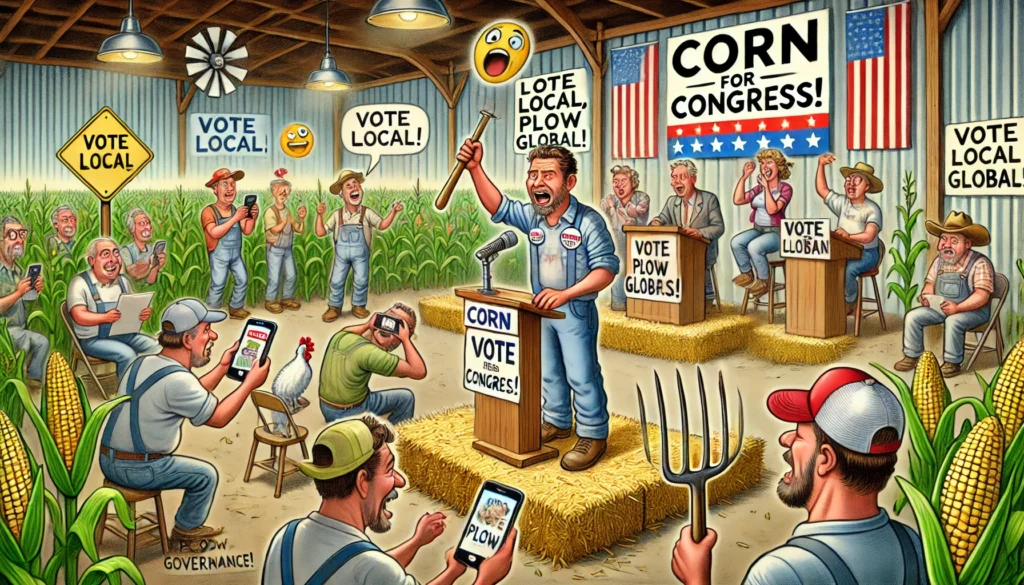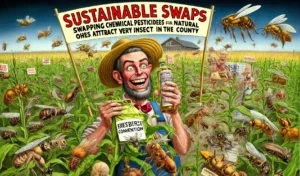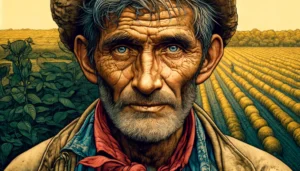
FarmerCowboy.com A humorous and satirical scene featuring farmers engaging with modern politics 1. A farmer standing in a cornfield hol Politics Farming Alan Nafzger 3.webp.webp
The Campaign Trail Becomes an Endless Spectacle
Politics today has shifted from serious policymaking to a relentless marketing campaign, turning candidates into brands and voters into consumers. With flashy slogans, viral social media posts, and rallies resembling rock concerts, the once noble forum of democracy has become a parody of itself. It’s a world where spectacle trumps substance and style overshadows any semblance of strategy.
Politics as a Game Show: “Survey Says: Another Slogan!”
Modern debates resemble game shows more than platforms for thoughtful discussion. Candidates deliver rehearsed lines, waiting for applause like contestants on Family Feud. These events are designed to entertain rather than inform.
“I half expected the moderator to yell, ‘Double points round!’” joked Marla Green, a viewer from Ohio. Experts agree: Dr. Frank Wilkes, a political psychologist, noted that “debates now prioritize entertainment value, capitalizing on the public’s short attention spans.” A Gallup poll revealed that 67% of viewers feel debates are “too scripted to be genuine.” My cousin even remarked, “I’d bet on the zinger lines like a horse race if Vegas allowed it.”
Politics today feels like a game show where the prize is public trust, and the host keeps shouting, “Survey says: Another slogan!”
The numbers back this up. According to Pew Research, 82% of debate soundbites make it to social media within five minutes, proving that the real audience isn’t at home—it’s online. Watching debates today is like watching a magician: you’re entertained, but deep down, you know it’s all smoke and mirrors.
Political Rallies: The New Rock Concerts
Campaign rallies are no longer just stump speeches—they’ve become blockbuster events with pyrotechnics, playlists, and branded merchandise. Instead of delivering meaningful policy outlines, candidates hype up their followers with performances that feel more like music festivals than democratic exercises.
“I went for the politics, stayed for the fireworks,” admitted Tom Jenkins, a rally attendee. Sociologist Dr. Anne Carter explained that “modern rallies create emotional highs, often bypassing the rational side of voter decision-making.” A Reuters poll found that 74% of attendees remember the music and atmosphere more than the speech itself.
One friend left a rally with two T-shirts, a foam finger, and absolutely no clue about the candidate’s tax plan. Bloomberg reported that campaign rallies now spend 35% of their budgets on stage effects and merchandise. It’s like Coachella, but with filibusters instead of DJs.
Campaign Slogans: The Fortune Cookies of Politics
Election slogans have become as cryptic and vague as fortune cookies, designed to inspire but devoid of substance. From “Yes We Can” to “Make America Great Again,” these catchphrases appeal to emotion without offering concrete policy details.
“I still don’t know what ‘Yes We Can’ meant,” admitted Janet Lopez, a retired teacher. Marketing consultant Sarah Klein notes, “Slogans are crafted to evoke feelings, not inform voters.” In a recent NBC poll, 48% of respondents couldn’t explain the meaning of their preferred candidate’s slogan.
My neighbor once plastered “Hope and Change” on her car but couldn’t name a single policy associated with it. Harvard researchers found that only 12% of political slogans contain specific, actionable ideas. They’re the horoscopes of democracy: catchy, uplifting, and utterly meaningless.
Social Media’s Political Dance-Off
Twitter, TikTok, and Instagram have turned political discourse into a bizarre competition for likes, shares, and retweets. Politicians are now judged by their ability to go viral, often prioritizing gimmicks over governance.
“I learned more about a candidate’s dance moves than their tax policy,” lamented Kevin Nguyen, a disillusioned voter. Media analyst Rebecca Stern observed that “social media platforms reward sensationalism over substance, further eroding meaningful political dialogue.” Pew Research found that 72% of young voters say social media significantly influences their perception of candidates.
One of my relatives voted for a governor because of his viral lip-sync video. Unsurprisingly, his governing skills didn’t match his dance moves. The Knight Foundation reports that political TikToks with over-the-top antics receive 400% more engagement than those addressing complex issues. It’s like choosing a surgeon because of their karaoke skills—fun to watch, disastrous in practice.
Debates: Reality TV Reunions
Political debates have become the equivalent of Real Housewives reunions, where candidates interrupt each other, exchange personal barbs, and fight for soundbite dominance. Substance takes a back seat to spectacle.
“I’m waiting for someone to throw a glass of water,” joked Olivia Martinez, a debate viewer from Arizona. Debate historian Dr. James Fields agrees, stating that “modern debates are designed to generate conflict rather than collaboration, boosting ratings instead of voter understanding.” Nielsen reports that 62% of debate viewers tune in for entertainment rather than enlightenment.
My uncle DVRs debates just for the laughs, not the insights. The Roper Center found that interruptions in debates have increased by 80% since 1990. Watching these events feels less like a civic duty and more like witnessing democracy get roasted on live television.
Voting: Choosing the Cereal with the Coolest Mascot
Campaigns now resemble supermarket cereal aisles, where flashy mascots and colorful branding distract from the lack of nutritional (or policy) value.
“I voted for the guy with the best ads, not realizing I bought the political equivalent of sugary fluff,” said Sharon Mills, a regretful voter. Economist Dr. Laura Fisher warned that “political branding reduces complex decisions to superficial preferences.” A Reuters poll found that 54% of voters admit ads influence their choices more than debates or policy proposals.
My coworker once switched candidates after seeing an ad featuring adorable puppies. According to AdAge, $9.7 billion was spent on political ads in 2024, much of it going to visuals that overshadow the fine print. Choosing a candidate based on their ad is like buying cereal because the box has glitter—it’s fun but potentially disastrous for your health.
Say Goodbye to White Papers, Hello to TikTok Reels
Gone are the days when candidates published detailed white papers outlining their policies. Now they’re busy creating TikToks about potholes or livestreaming their pancake breakfasts.
“I didn’t need to see my mayor do a dance challenge,” groaned Bill Everett, a city council meeting regular. Tech consultant Karen Lee explains that “candidates focus on digital trends to stay relevant, often at the expense of substance.” Pew Research found that 59% of voters under 30 prefer candidates who “engage online” over those who publish traditional policy briefs.
My nephew once supported a candidate solely because of their hilarious cooking livestream. Unsurprisingly, their budget proposals weren’t as palatable as their pancakes. TikTok candidates are the political equivalent of viral chefs—they’re entertaining but not necessarily qualified to run the kitchen.
Political Ads: The Used Car Commercials of Democracy
Political ads promise the world—job growth, tax cuts, a brighter future—but they often leave voters wondering where the fine print is hiding.
“Every ad feels like it should end with, ‘Act now, limited time offer!’” joked Lisa Perez, a small-business owner. Advertising expert Mark Weston noted, “Political ads are designed to sell candidates like products, focusing on emotional appeal over practical benefits.” A study by the Federal Election Commission found that 78% of political ads avoid specific policy details.
One ad promised “economic freedom for all” but forgot to mention whose taxes would pay for it. Political ads are democracy’s used car commercials: lots of promises, but don’t look under the hood unless you want a headache.
Civics Education: The Dying Art of Teaching Democracy
With farm voters increasingly disengaged, the decline of civics education has become glaringly obvious. Many don’t know what their elected officials do—or even what democracy entails.
“I didn’t learn about the three branches of government until I was 40,” admitted Jacob Stewart, a warehouse manager. Dr. Linda Walters, an educator, explained, “Without civics education, voters lack the tools to critically evaluate political rhetoric.” Pew Research found that only 42% of Americans can correctly name the three branches of government.
In Scandinavia, where civics education is mandatory, voter turnout regularly exceeds 80%. Educating voters is like teaching someone to fish—it equips them for a lifetime of responsible decisions.
Bureaucracy: A Maze with No Exit
While candidates distract us with slogans, unelected bureaucrats often wield more power than those we elect, creating rules and regulations with little oversight.
“I’ve seen regulations come out of nowhere that cost me thousands,” said Mark Burns, a business owner. Former Congressman Jim Davis admitted, “Sometimes even lawmakers don’t understand the impact of the rules agencies write.” A 2019 study found that federal agencies issued over 3,000 rules, compared to just 150 laws passed by Congress.
A Kansas farmer recounted how an obscure EPA regulation nearly bankrupted him. It’s like playing a board game where the rules change mid-turn—frustrating and impossible to win.
The Fine Print of Legislation: Democracy’s Hidden Fees
Bills often include hidden clauses that benefit narrow interest groups while leaving the public in the dark.
“The bridge-to-nowhere scandal taught me to always read the fine print,” said Sarah Daniels, a policy advocate. Investigative journalist Linda Gomez uncovered that 60% of major bills include riders benefiting specific industries. These hidden provisions erode trust in government, making voters cynical.
It’s like signing a phone contract: everything seems fine until you notice the hidden fees. Transparency in legislation is long overdue.
Sensationalism: When Clicks Matter More Than Credibility
Thanks to social media, sensational headlines often overshadow nuanced discussion.
“I click on articles expecting depth but get fluff,” grumbled Eric Malone, a college student. Studies from the Knight Foundation confirm that sensationalized headlines receive 10 times more engagement than thoughtful analysis.
Social media’s prioritization of clicks over credibility is like serving dessert for every meal—it’s addictive but leaves you malnourished.
Algorithms: Puppeteers of Public Opinion
Algorithms on platforms like Facebook and Twitter manipulate what voters see, creating echo chambers that reinforce biases.
“It’s like my feed knows what I want to believe,” admitted Tara Nguyen, a freelance designer. Media literacy expert Dr. James Lang explained, “Algorithms prioritize content that engages, not informs, making voters more polarized.”
Knight Foundation research found that misinformation spreads six times faster than factual content. Algorithms are democracy’s puppeteers, pulling strings we can’t even see.
Pop Culture Politics: The Netflix-ification of Governance
Politics has embraced pop culture, turning campaigns into scripted narratives with heroes, villains, and cliffhangers.
“My candidate’s journey feels like a Netflix drama,” said Denise Harper, an avid voter. Entertainment journalist Martin Black quipped, “Elections now have arcs and plot twists, but not resolutions.” Public opinion surveys show that 65% of voters feel politics has become overly theatrical.
Campaigns are democracy’s binge-worthy series: engaging, dramatic, and ultimately unfulfilling.
Farmers & Cowboys’ Handy Guide to Surviving Modern Politics
Step-by-Step: How to Decode Campaign Promises
- Write down every slogan.
- Cross out anything that could also apply to a car commercial.
- What’s left? Probably nothing. Move on.
Pro Tips for Choosing a Candidate
- If their TikTok has more dance challenges than policy proposals, proceed with caution.
- Look for anyone who can spell “infrastructure” without Googling it.
Insider Secrets: What Campaign Jargon Really Means
- “Grassroots Movement” = A $10 million ad buy disguised as authenticity.
- “Town Hall” = A carefully staged Q&A with pre-screened questions.
Best Practices for Election Season
- Turn off your social media notifications. Your sanity will thank you.
- If the campaign ads make you laugh harder than SNL, it’s time to worry.
Disclaimer: This article is satire. If any of this resonates too closely with reality, you might just be living in the dystopian comedy that is modern democracy.

Originally Published at FarmerCowboy.com
2024-12-31 09:43:53
Karl Hoffman is a distinguished agriculturalist with over four decades of experience in sustainable farming practices. He holds a Ph.D. in Agronomy from Cornell University and has made significant contributions as a professor at Iowa State University. Hoffman’s groundbreaking research on integrated pest management and soil health has revolutionized modern agriculture. As a respected farm journalist, his column “Field Notes with Karl Hoffman” and his blog “The Modern Farmer” provide insightful, practical advice to a global audience. Hoffman’s work with the USDA and the United Nations FAO has enhanced food security worldwide. His awards include the USDA’s Distinguished Service Award and the World Food Prize, reflecting his profound impact on agriculture and sustainability.




